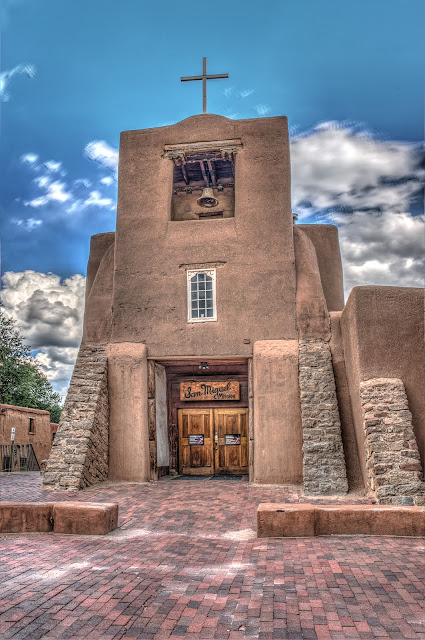Day 12 (D-49) Spanish Missions in New Mexico / Willa Cather
Day 12 5D-49) Something we won't have time to visit: Spanish Missions.
A Christian mission is an organized effort to spread Christianity to new converts. The Spanish Missions were established by Franciscan friars, missionaries, under charter of the Spanish Empire and the government of the Viceroyalty of New Spain with the intention of converting the Native Americans (Indians) to Christianity. Those concerned were many of the 21 distinct Puebloan groups: the Tiwa, the Navajo and the Apache.
We won't have time to visit one, so I give you here a photo of the San Miguel Mission in Santa Fe.
San Miguel Church is sometimes referred to as the oldest church in the USA and is located on Old Santa Fe Trail. The original church, which had been built of adobe around 1610, was burned during the Pueblo Revolt of 1680. The current adobe structure was built in 1710. There have been many renovations through the years. (A thought for the Cathedral Notre Dame de Paris, April 15, 2019).
By Dsdugan - Own work, CC0, https://commons.wikimedia.org/w/index.php?curid=58089706San Miguel Church is sometimes referred to as the oldest church in the USA and is located on Old Santa Fe Trail. The original church, which had been built of adobe around 1610, was burned during the Pueblo Revolt of 1680. The current adobe structure was built in 1710. There have been many renovations through the years. (A thought for the Cathedral Notre Dame de Paris, April 15, 2019).
This is a good time for a quick literature break.
Willa Cather (1873-1947) was an American writer of poetry and novels and known for such works as O Pioneers! and My Antonia, stories of immigrants and frontier life in 19th century America.
She also wrote Death Comes for the Archbishop (1927),
the story of two French missionaries, a bishop and a priest, who leave their work in Ohio to establish a diocese in New Mexico Territory.
Cather preferred to call Death Comes for the Archbishop a "narrative" rather than a novel.
She writes about "a single human life lived simply in the silence of the southwestern desert. In 1851 Father Jean Marie Latour comes to serve as the Apostolic Vicar to New Mexico. What he finds is a vast territory of red hills and tortuous arroyos, American by law but Mexican and Indian in custom and belief. In the almost forty years that follow, Latour spreads his faith in the only way he knows--gently, all the while contending with an unforgiving landscape, derelict and sometimes openly rebellious priests, and his own loneliness. Out of these events, Cather gives us an indelible vision of life unfolding in a place where time itself seems suspended." (from a book cover)
OR in French, if you prefer (La Mort et L'Archevèque):
Un soir de l'été 1848, Rome décide d'envoyer le père Latour, qui exerce son ministère près des Grands Lacs, ranimer la foi au Nouveau-Mexique. A dos de cheval, Jean-Marie Latour et son fidèle Joseph Vaillant inventorient leur diocèse au fil des années : des terres immenses aux couleurs changeantes, une flore chaque jour nouvelle. De village en village, ils font connaissance des populations indiennes et mexicaines souvent hautes en couleur, qui séduisent immédiatement nos deux prélats. Jean-Marie Latour y restera quarante ans et y mourra d'avoir vécu". L'histoire du catholique monseigneur Latour est prétexte pour l'épiscopalienne Willa Cather à une éblouissante démonstration de ce qu'elle appelait la création véritable : "ce qui est ressenti sur la page sans y être spécifiquement nommé."
You can listen to a mini-review of the book here:
https://www.youtube.com/watch?v=v2_gVgJpbak 1 minute and 34 seconds
Perhaps you would like to read the book.
My best,
Jane
______________________________________________
--arroyos = https://dictionary.cambridge.org/fr/dictionnaire/anglais/arroyo
--spread = répandre
--gently = doucement
-- derelict = négligent
--contend with = https://dictionary.cambridge.org/fr/dictionnaire/anglais/contend-with-something-someone
--all the while = pendant tout ce temps
--unfold = se dérouler




Comments
Post a Comment